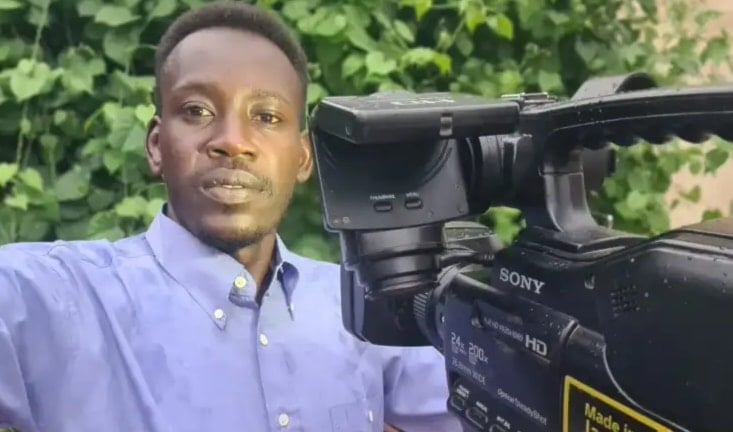CPJ sounds alarm as journalists go missing in RSF-held El Fasher
The Committee to Protect Journalists reports at least 13 media workers missing in El Fasher, where the RSF faces accusations of rape, killings, and abductions.
-

Sudanese journalist Muammar Ibrahim was detained by the Rapid Support Forces (RSF) paramilitary group in El Fasher (Courtesy of Muammar Ibrahim)
The Committee to Protect Journalists (CPJ) has raised alarm over the fate of reporters trapped in Sudan’s El Fasher after the Rapid Support Forces (RSF) claimed full control of the North Darfur capital last weekend, amid reports of abductions, sexual assaults, and killings.
In a statement published this week, the press freedom watchdog said it had received credible reports that at least 13 journalists have gone missing in the besieged city since October 26, when the RSF announced it had seized the area following 18 months of siege. The city’s fall marks the group’s final step toward controlling all of Darfur and establishing a rival administration in western Sudan.
Reports from El Fasher reveal widespread atrocities by the Rapid Support Forces, including summary executions, ethnic killings, and attacks on hospitals. pic.twitter.com/J6gN5E5DOm
— Al Mayadeen English (@MayadeenEnglish) November 2, 2025
Freelance journalist Muammar Ibrahim appeared in a video circulated on RSF-linked Telegram channels shortly after his disappearance, surrounded by armed men believed to be RSF fighters. The group later denied holding him. CPJ said the whereabouts of several others, including Khalid Abu Warqa and Magdi Youssef, remain unknown.
The Darfur Women Journalists Forum also informed CPJ that at least three female journalists were raped by RSF fighters during the offensive, part of what rights groups describe as a broader pattern of sexual violence against civilians.
'Absolute collapse of accountability in Sudan'
The RSF, a paramilitary force that evolved from the Janjaweed militias, has been accused by the European Union and international rights organizations of committing ethnically motivated atrocities. Sudan’s government says the group killed up to 2,000 civilians in El Fasher over the course of two days, marking one of the deadliest escalations since the conflict with the Sudanese army began in April 2023.
CPJ regional director Sara Qudah said the video showing Ibrahim’s detention “reflects the absolute collapse of accountability in Sudan,” adding that journalists “can be kidnapped and their suffering broadcast to the world, and still no action is taken.”
🚨 Sudanese journalist Muammar Ibrahim @MUAMMAR_SUD, a well-known field reporter from Al-Fashir, has been captured by the Rapid Support Forces (RSF) amid ongoing clashes in the city. pic.twitter.com/Wd8FjgcPh8
— Abdelaziz Yakub (@AbdelazizYakub) October 26, 2025
The organization said it contacted the RSF for comment through its website but received no response. CPJ also noted that Sudan’s army has been accused of committing serious abuses, including airstrikes and the arbitrary arrest of journalists.
CPJ called on all parties to ensure the safety of journalists and demanded the immediate release of those detained.
Thousands flee Sudan’s El Fasher on foot without food or water: UNICEF
Thousands of displaced families have walked more than 60 kilometers without food or water to escape the escalating violence in El Fasher, the capital of North Darfur, the UN Children’s Fund (UNICEF) said earlier today.
“In Tawila, North Darfur, thousands of families are fleeing violence in El-Fasher, arriving exhausted, hungry & malnourished,” UNICEF said in a statement on the US social media platform X.
In #Tawila, North Darfur, thousands of families are fleeing violence in Al Fasher, arriving exhausted, hungry & malnourished.@UNICEF teams, like Abubakar, Nutrition Specialist, are on the ground providing lifesaving support to children and families who’ve lost everything. pic.twitter.com/JVHL079b1E
— UNICEF Sudan - اليونيسف في السودان (@UNICEFSudan) November 1, 2025
Abubakar Ahmed, a UNICEF nutrition specialist, said more than 6,000 people fled from El Fasher to Tawila last week alone, most of them women and children, and that displaced families continue to arrive daily.
The displaced, he said, “came in a very bad, poor condition due to the long roads” between the two cities, which stretch over 60 kilometers. Many make the journey entirely on foot, often taking four or five days.
“The displaced face major challenges along the way, with some being beaten, while others spend days without food or water,” Ahmed said. “When they arrive, really, they looked thirsty, and most of them are malnourished, even children and adults.”
According to UNICEF, many children arrived alone, separated from their families, and unaware of their relatives’ whereabouts.
Read more: RSF’s ‘Abu Lulu’ arrest branded a PR hoax amid El Fasher carnage

 4 Min Read
4 Min Read








